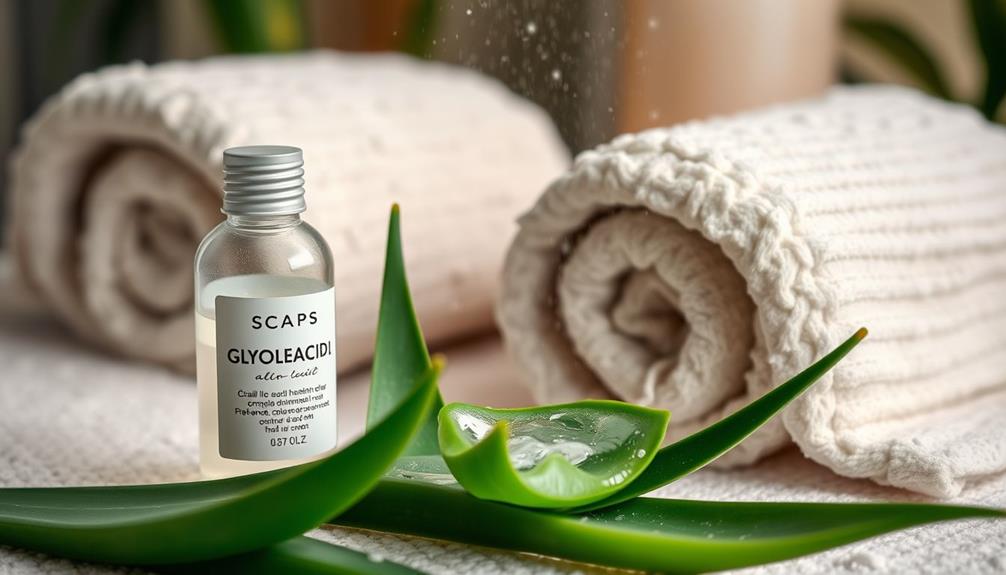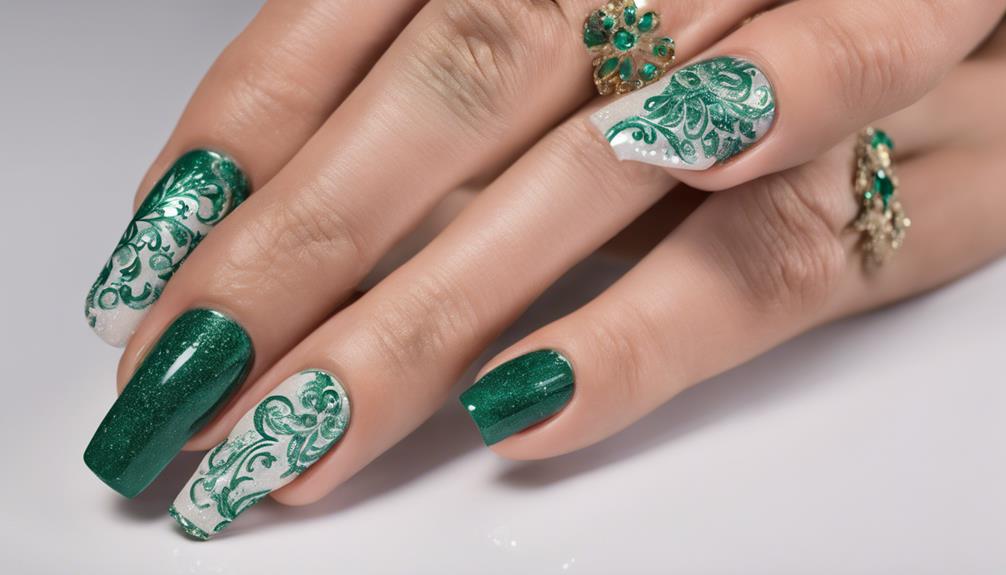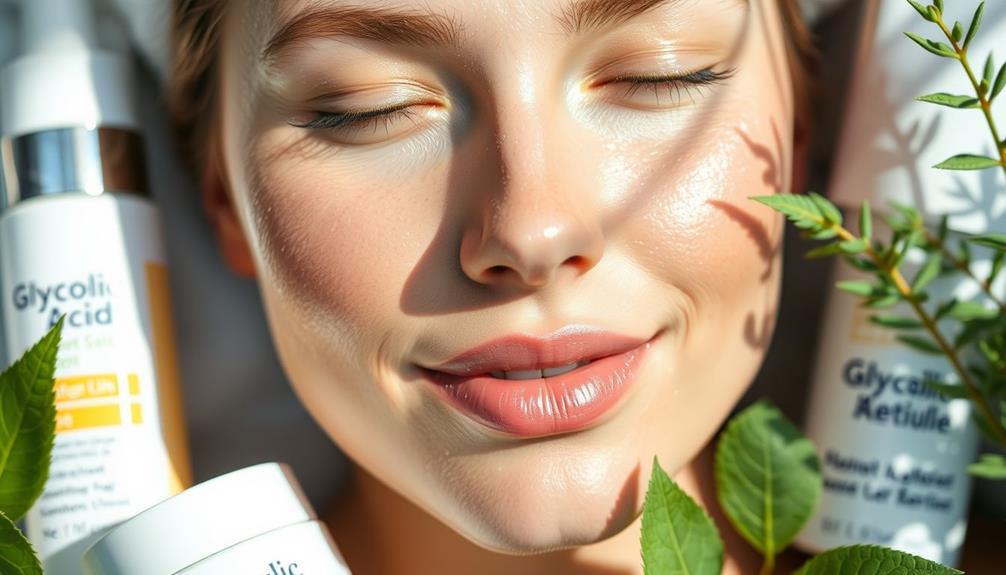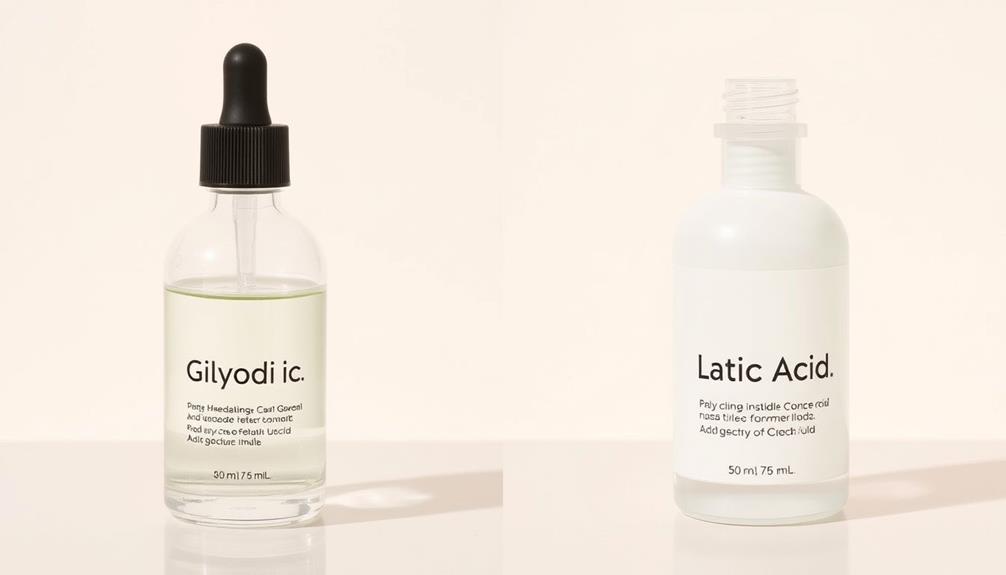Glycolic acid is gaining traction in scalp care, and for good reason. Experts highlight its ability to exfoliate dead skin and product buildup, improving scalp hygiene and promoting healthier hair growth. It balances oiliness, reduces dandruff, and enhances hydration for softer hair. To get the most out of it, apply it on damp hair, massage it into your scalp, and let it sit for a few minutes before rinsing. Always perform a patch test to verify your scalp tolerates it. Want to find out which products experts recommend and how to incorporate them into your routine?
Key Takeaways
- Glycolic acid effectively exfoliates the scalp, promoting healthier hair growth and reducing dandruff and flakiness.
- Dermatologists recommend gradual introduction and patch testing to minimize irritation and personalize usage.
- Regular monitoring of scalp reactions is essential to prevent over-exfoliation and maintain scalp health.
- Combining glycolic acid with hydrating and soothing ingredients enhances its benefits for scalp care.
Rise in Popularity
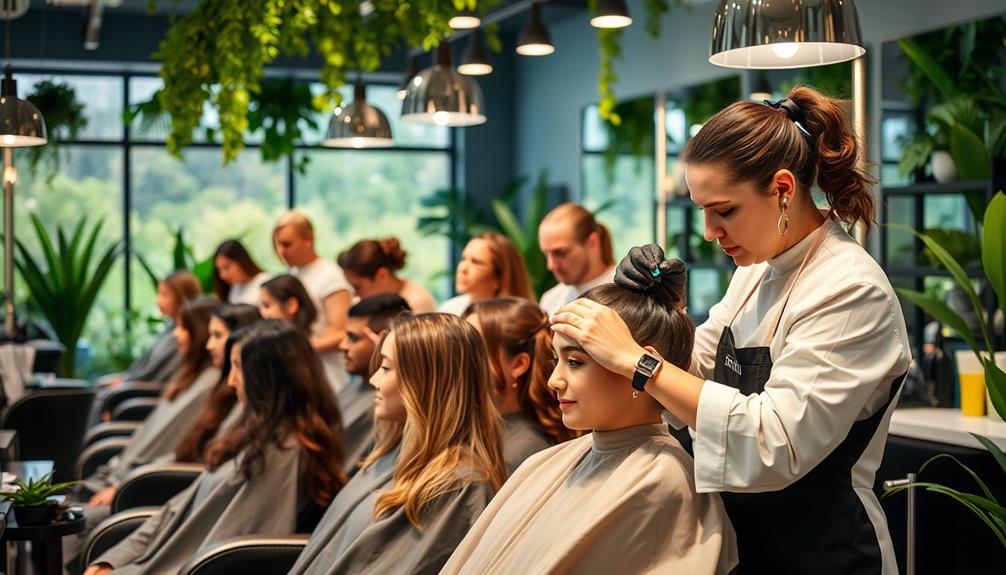
Have you noticed the surge in glycolic acid's popularity for scalp care? This rise is largely due to increased consumer awareness about scalp health and the effectiveness of glycolic acid's exfoliating properties.
People are becoming more informed about the benefits of chemical exfoliation for addressing issues like dandruff and oily scalps, which can also be supported by natural remedies like essential oils for scalp health essential oils for scalp health.
Brands like The Ordinary have made glycolic acid accessible and affordable, further fueling its demand among consumers seeking effective hair care solutions.
Social media, especially platforms like TikTok, has played a significant role in this trend. Viral videos showcase the benefits of glycolic acid for dandruff management and overall scalp health, making it a go-to ingredient for many.
Dermatologists have long endorsed glycolic acid for treating scalp conditions, which has led to its growing presence in various hair care products.
As more research supports its effectiveness, the market for scalp care featuring glycolic acid is projected to expand.
Influencers continue to advocate for its use, ensuring that both consumers and professionals recognize the importance of this ingredient in maintaining a healthy scalp.
Benefits for Scalp Health
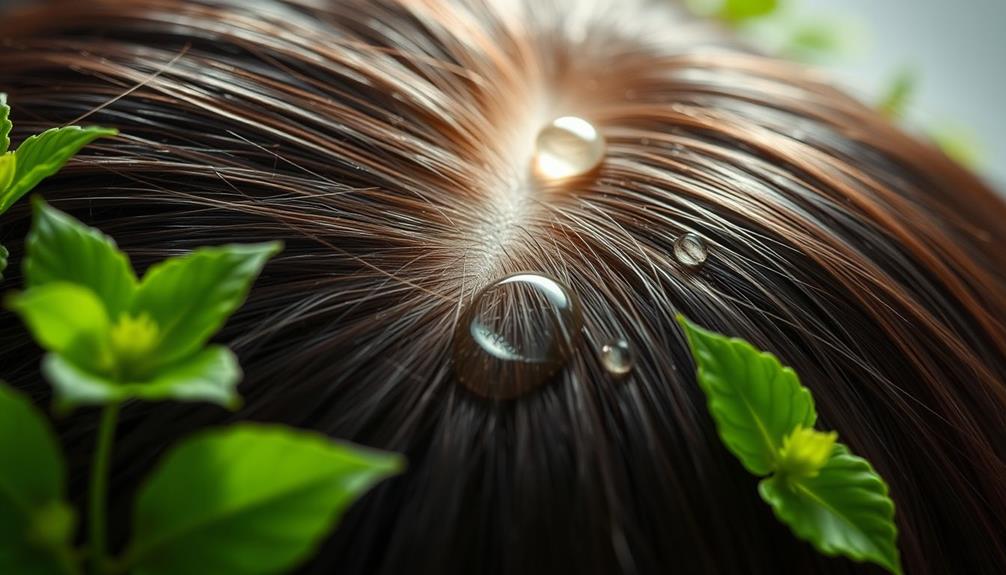
When you use glycolic acid on your scalp, you're not just exfoliating—you're promoting a healthier environment for hair growth.
This focus on creating functional spaces can be paralleled to how glycolic acid helps keep your scalp hydrated while balancing moisture levels, which leads to softer, more manageable hair.
Exfoliation and Renewal
By incorporating glycolic acid into your scalp care routine, you can effectively exfoliate and renew your scalp, leading to improved overall health and hygiene. This mild alpha hydroxy acid works wonders by removing dead skin cells and product buildup, creating an environment that promotes hair growth.
Regular scalp treatments with glycolic acid enhance cell turnover, which can help reduce dandruff and flakiness. As you clear away impurities, you're also unclogging hair follicles, paving the way for a healthier scalp.
Here's a quick look at the benefits of using glycolic acid for scalp care:
| Benefit | Description | Effect on Scalp |
|---|---|---|
| Exfoliating | Removes dead skin cells and product buildup | Cleaner scalp |
| Promotes cell turnover | Enhances the natural renewal process | Improved scalp condition |
| Stimulates hair growth | Creates a healthier environment for hair follicles | Thicker, healthier hair |
| Balances pH | Reduces excess oiliness | Fresher scalp |
| Reduces dandruff | Helps alleviate flakiness | Smoother scalp surface |
Incorporate glycolic acid into your routine for a healthier scalp today!
Hydration and Moisture Balance
Glycolic acid greatly boosts scalp hydration, ensuring your hair remains healthy and manageable. This powerful compound acts as a moisture magnet, drawing water into the scalp and preventing dryness.
By exfoliating dead skin cells and removing product buildup, glycolic acid enhances your scalp's ability to retain moisture effectively. Regular use of glycolic acid not only improves scalp hydration but also helps maintain the moisture balance essential for overall health, similar to how hair treatments for damage can restore moisture.
When your scalp's pH is balanced, it fosters an environment where hydration can thrive, reducing the risk of hair breakage. This means you can enjoy stronger, more resilient hair.
Additionally, improved scalp hydration contributes to healthier hair texture, making your locks easier to style and manage. You'll notice a difference in how your hair feels and behaves, as enhanced moisture levels promote shine and softness.
Incorporating glycolic acid into your scalp care routine is a smart choice for anyone looking to improve scalp hydration and maintain ideal moisture levels. With its exfoliating properties and ability to promote a balanced, hydrated scalp, glycolic acid can greatly enhance your hair care regimen.
Application Guidelines
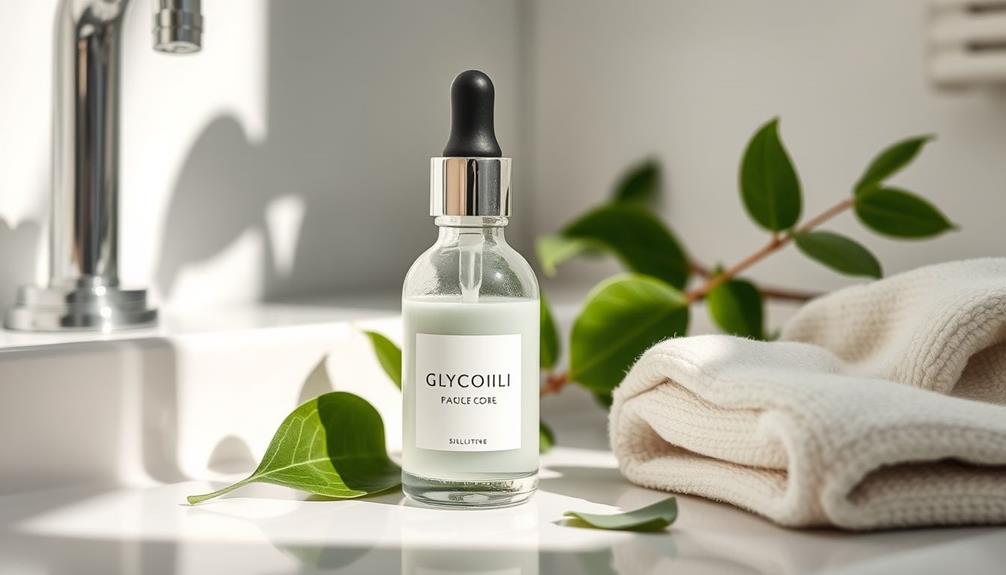
To achieve ideal results, apply glycolic acid to your scalp once or twice a week, adjusting frequency based on how sensitive your scalp feels. This exfoliating scalp treatment can help promote healthier hair, but you need to follow some vital application guidelines to maximize its effectiveness.
- Apply on Damp Hair: For better absorption, apply glycolic acid to your scalp on damp hair. This helps the product penetrate deeper and work effectively.
- Massage and Set Time: Gently massage the product into your scalp and let it sit for 5-10 minutes. This allows the glycolic acid to exfoliate and cleanse your scalp properly.
- Rinse Thoroughly: After the designated time, rinse thoroughly to eliminate any residual product. This step is essential to prevent irritation from leftover glycolic acid.
Before diving in, don't forget to perform a patch test to check for individual scalp sensitivity. Following these guidelines guarantees you get the most out of your glycolic acid treatment while keeping your scalp healthy and irritation-free.
Safety Precautions
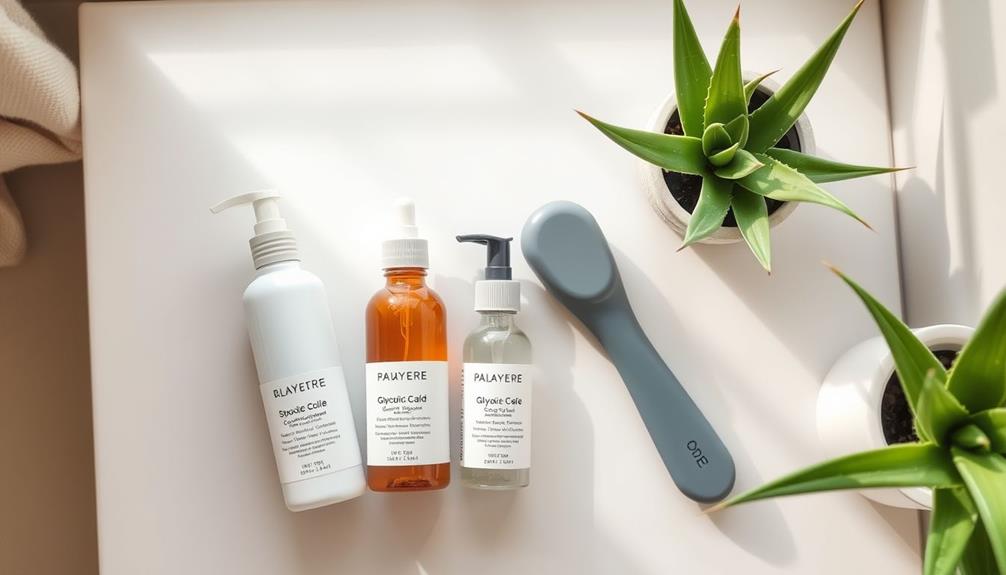
Before starting glycolic acid treatments, it's important to take into account several safety precautions to protect your scalp and skin.
First, consult with a dermatologist to confirm glycolic acid is suitable for your scalp type and condition. This step is essential, especially if you have any existing issues.
Next, if you have sensitive skin, perform a patch test before applying it more broadly. Apply a small amount of glycolic acid to an inconspicuous area and wait 24 hours to check for any irritation. Avoid using it on broken or inflamed skin, as this can lead to further irritation and complications.
Once you start using glycolic acid, be mindful of your scalp's reactions. Adjust your application frequency based on your sensitivity to prevent over-exfoliation and dryness.
Additionally, since glycolic acid can increase skin sensitivity, it's important to invest in sun protection. Make sure to apply sunscreen to your scalp when exposed to the sun to minimize the risk of damage.
Expert Insights
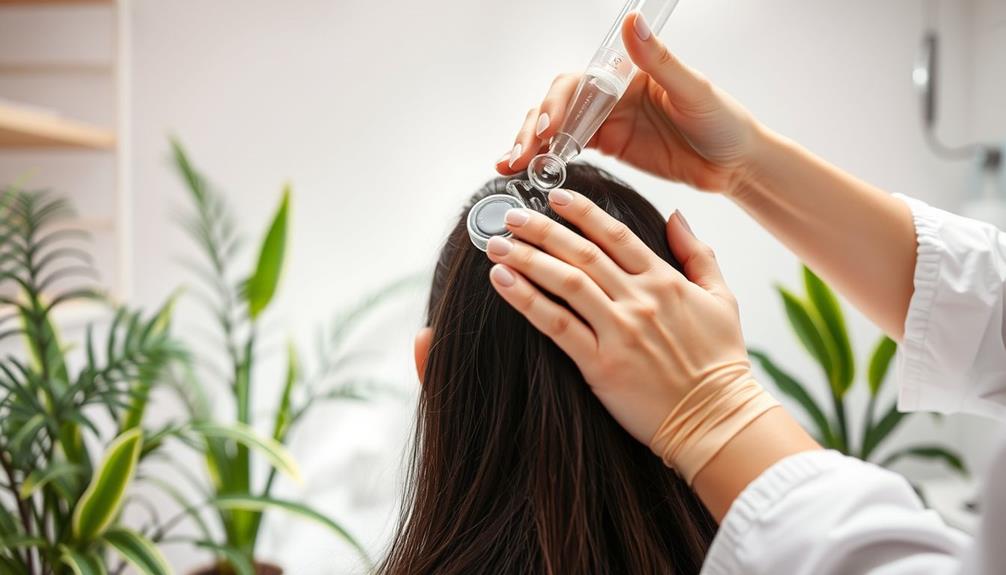
Experts stress that understanding the proper application techniques for glycolic acid is crucial to prevent potential scalp damage. When considering glycolic acid for scalp health, here are three key insights from dermatologists: Understanding the benefits of glycolic acid, such as its ability to exfoliate the scalp and promote healthy hair growth, is essential. Dermatologists also recommend starting with a low concentration of glycolic acid and gradually increasing as tolerated to minimize the risk of irritation. Additionally, it is important to always use sunscreen on the scalp when using glycolic acid to protect the skin from potential sun damage.
- Start Slowly: Gradually introduce glycolic acid into your routine. This allows your scalp to adjust and helps you monitor reactions effectively.
- Exfoliation Benefits: Glycolic acid's exfoliating properties can aid in treating various scalp conditions, but it's important to use it correctly to avoid irritation.
- Personalized Skincare: No two scalps are alike. Tailor your skincare routine based on your specific scalp health needs and consult a dermatologist for guidance.
Both Marisa Garshick, MD, and Azadeh Shirazi, MD, emphasize the importance of professional advice, especially if you have sensitive skin or existing scalp conditions. They recommend keeping an eye on how your scalp reacts and adjusting your approach as needed.
Product Recommendations
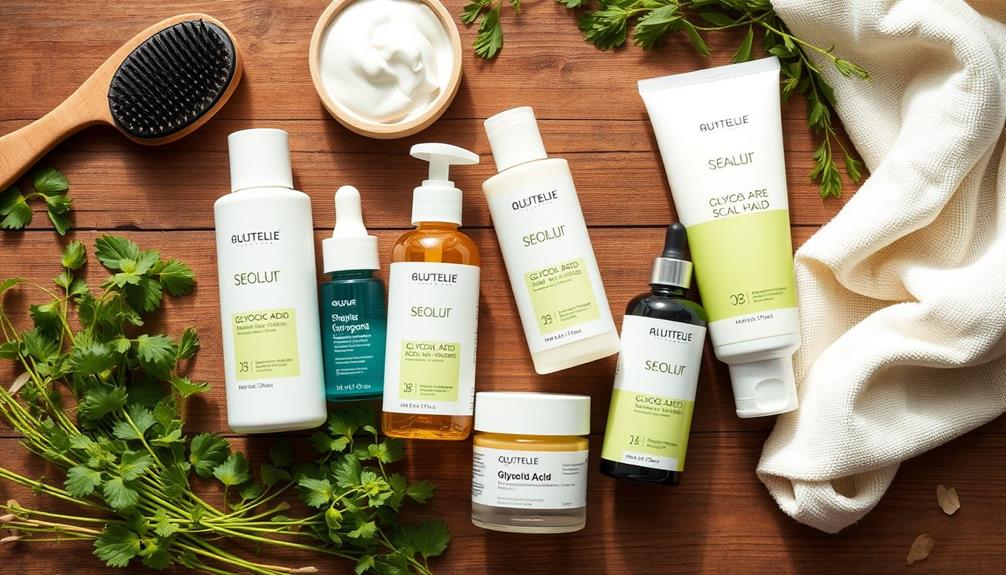
Finding the right products for incorporating glycolic acid into your scalp care routine can greatly enhance your scalp's health and overall hair vigor.
A top choice is The Ordinary's Glycolic Acid 7% Toning Solution, which is effective for managing oily, itchy scalps and dandruff. Priced at just $12, it's gained popularity with over 300K views on TikTok.
For a more hands-on approach, consider The Inkey List's Glycolic Acid Exfoliating Scalp Scrub at $14.99. This pre-shampoo product enhances scalp health through chemical exfoliation, helping to clear away dead skin and buildup.
If you're looking to keep your hair moisturized, JVN Hair Nurture Hydrating Conditioner is a perfect complement to glycolic acid treatments. It provides essential hydration to your scalp and hair, ensuring your locks remain vibrant and healthy.
For those dealing with persistent dandruff, both Philip Kingsley Flaky/Itchy Scalp Anti-Dandruff Shampoo and Head & Shoulders Classic Clean Anti-Dandruff Shampoo are reliable alternatives. These options can effectively alleviate symptoms while supporting your overall scalp care routine.
Long-term Considerations

Long-term use of glycolic acid on your scalp requires careful consideration to maintain scalp health and avoid potential side effects. While it can help with various scalp issues, it's vital to monitor its application as prolonged use may lead to adverse reactions.
Here are three key points to keep in mind:
- Consult a Dermatologist: Regular check-ins with a dermatologist are important to assess your scalp's health and determine the best hair products for your needs, especially if you're experiencing persistent issues.
- Monitor Hair Strength: Glycolic acid can weaken hair at the roots over time. Keep an eye on your hair's strength and adjust your usage accordingly. Reducing application to once a month after initial treatments can help mitigate this risk.
- Consider Color-Treated Hair: If you have color-treated hair, glycolic acid can be safe when used cautiously. However, regular assessments of your hair and scalp are necessary to guarantee no adverse effects develop.
Frequently Asked Questions
Is Glycolic Acid OK for Scalp?
Yes, glycolic acid's generally safe for your scalp, especially if it's oily or flaky. Just use it once or twice a week, and monitor your skin's reaction to avoid irritation or adverse effects.
What Happens if You Leave Glycolic Acid on Too Long on Scalp?
Leaving glycolic acid on your scalp too long can cause irritation and sensitivity. It may worsen dryness and flakiness, weaken hair roots, and increase breakage. Always follow the recommended leave-on time for best results.
What Are the Side Effects of Glycolic Acid on Hair?
Think of glycolic acid as a double-edged sword. It can smooth your scalp, but it also risks irritation, dryness, and even hair loss if overused. Always listen to your scalp and back off if you sense trouble.
Does Glycolic Acid Remove Hair Buildup?
Yes, glycolic acid effectively removes hair buildup. It penetrates deeply, dislodging stubborn residues and dead skin cells, promoting a cleaner scalp environment. Regular use can enhance overall scalp hygiene and improve hair health.
Conclusion
Incorporating glycolic acid into your scalp care routine can lead to healthier hair and skin.
For example, a case study involving a client with persistent dandruff showed significant improvement after using a glycolic acid treatment twice a week.
By exfoliating the scalp and promoting cell turnover, you can tackle issues like buildup and irritation.
Just remember to follow application guidelines and safety precautions to guarantee the best results for your scalp health.
